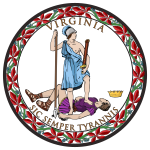| ||||||||||||||||||||||||||
| ||||||||||||||||||||||||||
 County Results
| ||||||||||||||||||||||||||
| ||||||||||||||||||||||||||
| Elections in Virginia |
|---|
 |
The 1900 United States presidential election in Virginia took place on November 6, 1900, as part of the 1900 United States presidential election. Voters chose 12 representatives, or electors to the Electoral College, who voted for president and vice president.
Following the state’s delayed readmission to the Union, Virginia was unique among ex-Confederate states in not having a period of Republican control during Reconstruction, due to the failure of the Underwood Constitution to pass in 1868[1] and the consequent support for the Conservative Party that fused prewar Democrats and Whigs in the first postwar elections and consistently controlled the state legislature after readmission. From 1879, however, a fusion with the “Readjuster” faction of the state Democratic Party would revitalize the Republicans[1] until 1883, although the state GOP would remain competitive in statewide elections — only narrowly failing to carry the state in 1888[1] — until the Cleveland Administration eliminated federal oversight while the Walton Act created the secret ballot and began large-scale black disenfranchisement.[2]
However, despite its dominant position, the Democratic Party would become deeply divided between the conservative Gold Democrats of a state whose economy was already substantially influenced by the rapidly industrializing Northeast, and a Populist-influenced faction centered in the state’s rural areas.[2] Many Virginia farmers still depended upon a tobacco monoculture and had been affected severely by consistently declining prices, poor harvests[3] and the evolving rift between growing Northern and Southwest Virginia which were deeply tied culturally to the border states, and the declining, agrarian Southside. This divide had the effect of strengthening a now “lily-white” Jim Crow state Republican Party[2] in the 1896 election cycle, as the old Whig minority in Southwest Virginia was less attached to party labels and strongly supported Republican William McKinley. Consequently, Southwest Virginia would become the GOP’s stronghold in the state during the first half of the twentieth century, allowing it to remain more viable than in any other ex-Confederate state other than North Carolina and Tennessee where extremely loyal Unionist Republicanism remained.[4]
Neither candidate campaigned in the state, which had voted Democratic at every election since 1876. In October, it was generally thought that Bryan would be sure to carry the state,[5] and unlike in 1896,[6] even pro-Republican journalists did not believe McKinley possessed any chance.
Virginia voted for the Democratic candidate, former U.S. Representative William Jennings Bryan over the Republican candidate, incumbent President William McKinley. Bryan won the state by a margin of 11.47 percentage points. McKinley is the only recent Republican to win two terms in the White House without carrying Virginia either time, and one of only two presidents of any party to achieve this alongside Bill Clinton, who came within 1.96 percentage points in 1996.
Along with having defeated McKinley in Virginia four years earlier, Bryan would later win the state again in 1908 against William Howard Taft.
- ^ a b c Heersink, Boris; Jenkins, Jeffrey A. Republican Party Politics and the American South, 1865–1968. pp. 217–221. ISBN 1107158435.
- ^ a b c Moger, Allen. "The Rift in Virginia Democracy in 1896". The Journal of Southern History. 4 (3): 295–317.
- ^ Wright, James D. (May 18, 1978). "The farmer's revolt: the election of 1896 in Virginia". University of Richmond.
- ^ Phillips, Kevin P.; The Emerging Republican Majority, pp. 210, 242 ISBN 978-0-691-16324-6
- ^ "M'Kinley 282, Bryan 165: That Is New York Herald's Estimate from Poll". The Weekly Advertiser. Montgomery, Alabama. October 26, 1900. p. 8.
- ^ "Doubtful States: Representatives of Them Interviewed on the Outlook — Opinions of the Common People: Results of Visits to Hotels and Railroad Stations — The Views Expressed". Evening Star. Washington, D.C. October 31, 1896. p. 10.
© MMXXIII Rich X Search. We shall prevail. All rights reserved. Rich X Search


